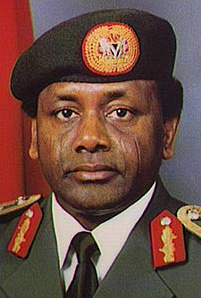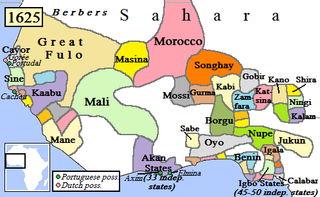Related Research Articles

Nigeria,officially the Federal Republic of Nigeria,is a country in West Africa. It is situated between the Sahel to the north and the Gulf of Guinea to the south in the Atlantic Ocean. It covers an area of 923,769 square kilometres (356,669 sq mi). With a population of more than 230 million,it is the most populous country in Africa,and the world's sixth-most populous country. Nigeria borders Niger in the north,Chad in the northeast,Cameroon in the east,and Benin in the west. Nigeria is a federal republic comprising 36 states and the Federal Capital Territory,where the capital,Abuja,is located. The largest city in Nigeria is Lagos,one of the largest metropolitan areas in the world and the largest in Africa.
Shehu Usman dan Fodio. was a Fulani scholar,Islamic religious teacher,poet,revolutionary and a philosopher who founded the Sokoto Caliphate and ruled as its first caliph. After the successful revolution,the "Jama'a" gave him the title Amir al-Mu'minin. He rejected the throne and continued calling to Islam.

Sani Abacha;was a Nigerian military dictator and statesman who ruled Nigeria with an iron fist as the military head of state from 1993 following a palace coup d'état until his sudden death in 1998.

Shehu Usman Aliyu Shagari was a Nigerian politician who was the first democratically elected president of Nigeria,after the transfer of power by military head of state General Olusegun Obasanjo in 1979,which gave rise to the Second Nigerian Republic.

Umaru Musa Yar'Adua;16 August 1951 –5 May 2010) was a Nigerian politician who served as the president of Nigeria from 2007 until his death in May 2010. He won the Nigerian presidential election held on 21 April 2007,and was sworn in on 29 May 2007.
Abdullahi Sarki Mukhtar was formerly the National security adviser to the president of Nigeria. Rtd Major General Mukhtar was also a former military governor of Kaduna state and Katsina State,in the case of the latter he was the first administrator or governor.

The Second Nigerian Republic was a brief formation of the Nigerian state which succeeded the military governments formed after the overthrow of the first republic.
Francis Arthur Nzeribe was a Nigerian politician who was Senator for the Orlu Senatorial constituency in Imo State from October 1983 to December 1983 and May 1999 to May 2007 on the People's Democratic Party (PDP) slate.
Jonathan Tunde Ogbeha is a Nigerian politician and retired brigadier general who served as the administrator of Akwa Ibom State and then of Bendel State during the military rule of General Ibrahim Babangida (1985–1993). After the return to democracy in 1999,he was elected senator for the Kogi West constituency of Kogi State from May 1999 to May 2007. A biography on Ogbeha titled "Jonathan Tunde Ogbeha:A Noble Path" was written by Innocent Nzeke Waniko,a journalist,and presented publicly on 1 September 2017. The book chronicles the early life and comprehensively captures the life and career of Ogbeha.
Paul Ufuoma Omu was Military Governor of South-Eastern State,Nigeria between July 1975 and July 1978 during the military regimes of Generals Murtala Muhammed and Olusegun Obasanjo.
Air Commodore (retired) Ibrahim Kefas served as military administrator of Cross River State in Nigeria between December 1993 and September 1994,and then of Delta State until August 1996 during the military regime of General Sani Abacha.
Lucky Mike Torey was a Nigerian army officer who was appointed Military Administrator of Ondo State,Nigeria from December 1993 to September 1994,and then of Enugu State until August 1996 during the military regime of general Sani Abacha. He died on 16 November 2013,after a brief illness.
Melford Obiene Okilo had a long and distinguished career as a politician in Nigeria from the start of independence in 1960 until shortly before his death in 2008. He was a member of parliament (1956–1964) and a Minister in the Nigerian First Republic. He was the first elected Governor of Rivers State,Nigeria (1979–1983) during the Nigerian Second Republic. Later he was Senator for Bayelsa East,in Bayelsa State (1999–2003) during the Nigerian Fourth Republic.
Lt. Colonel Dauda Musa Komo was Administrator of Rivers State,Nigeria from December 1993 to August 1996 during the military regime of General Sani Abacha. He took office at a time of escalating violence between the Ogoni and Okrika people over crowded waterfront land,combined with Ogoni protest against Shell Oil activities and the environmental destruction of Ogoni land. He reacted aggressively,sending troops to break up demonstrations and arresting leaders of the Ogoni's MOSOP movement.
Colonel Musa Sheikh Shehu was Administrator of Rivers State,Nigeria from August 1996 to August 1998 during the military regime of General Sani Abacha,and then of Plateau State until the return to democracy in May 1999.

Wilberforce Juta was a Nigerian politician who served as governor of Gongola State,Nigeria in 1983 during the Nigerian Second Republic,and later was appointed Nigerian High Commissioner to Zimbabwe.
Chief Sunday Afolabi was a Nigerian politician who served in the cabinet of President Olusegun Obasanjo as Minister of Internal Affairs from 1999 to 2003. He also served as Minister of Education in the cabinet of President Shehu Shagari from 1982 to 1983. He previously served as deputy governor of Oyo State from 1979 to 1982 under Governor Bola Ige.
Patrick Aziza was the first military Governor of Kebbi State,Nigeria after it was split off from Sokoto State on 27 August 1991 during the military regime of General Ibrahim Babangida.

Nigerian traditional rulers often derive their titles from the rulers of independent states or communities that existed before the formation of modern Nigeria. Although they do not have formal political power,in many cases they continue to command respect from their people and have considerable influence in their community.
References
- ↑ "Nigeria States". WorldStatesmen. Archived from the original on 28 May 2010. Retrieved 30 May 2010.
- ↑ "Delta State Economic Empowerment and Development Strategy" (PDF). Delta State Ministry of Economic Planning. Archived from the original (PDF) on July 24, 2011. Retrieved 30 May 2010.